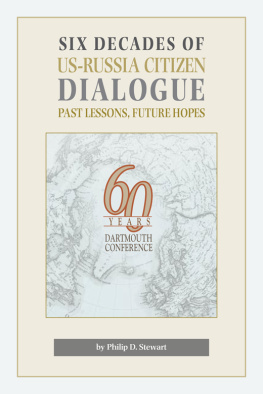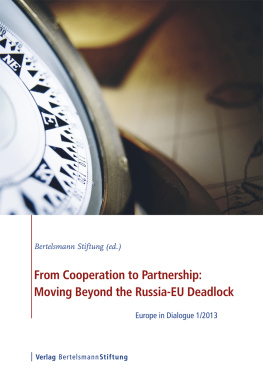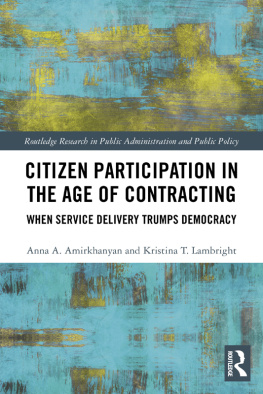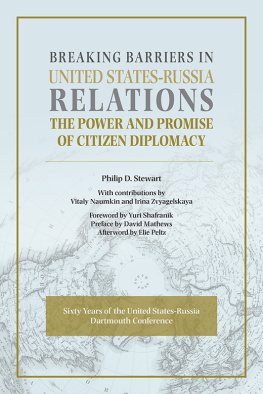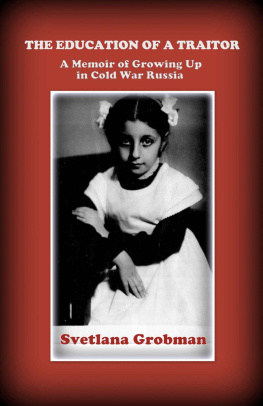
SIX DECADES OF
US-RUSSIA CITIZEN
DIALOGUE
PAST LESSONS, FUTURE HOPES
by Philip D. Stewart
Foreword by Yuri Shafranik
Preface by David Mathews
Sixty Years of the United States-Russia
Dartmouth Conference

Illustrated map of Northern Hemisphere (cover and interior):
I.Pilon/Shutterstock.com
2021 by the Kettering Foundation
ALL RIGHTS RESERVED
Six Decades of US-Russia Citizen Dialogue: Past Lessons, Future Hopes is published by the Kettering Foundation Press. The interpretations and conclusions contained in this book represent the views of the author. They do not necessarily reflect the views of the Charles F. Kettering Foundation, its directors, or its officers.
For information about permission to reproduce selections from this book, write to:
Permissions
Kettering Foundation Press
200 Commons Road
Dayton, Ohio 45459
This book is printed on acid-free paper.
First edition, 2021
Manufactured in the United States of America
ISBN: (print) 978-1-945577-54-3
ISBN: (ePDF) 978-1-945577-55-0
ISBN: (ePUB) 978-1-945577-56-7
Library of Congress Control Number: 2021936692
Contents
Foreword
On the Russia-United States Dartmouth Conference
by Yuri Shafranik
Preface
Dartmouth: Looking Forward
by David Mathews
Chapter One
Citizens Meeting the Challenges of a Relationship in Crisis
Chapter Two
The Dartmouth Conference: The First 30 Years (1960-1990)
Chapter Three
Years of Change and Experimentation (1991-2014)
Chapter Four
The Dartmouth Plenaries Renewed (2014-2019)
Chapter Five
A US Perspective
Chapter Six
Participants Who Shaped Dartmouth Outcomes
Chapter Seven
Dartmouths Next 60 Years
THROUGHOUT HISTORY, humanity has learned how to deal with and predict natural disasters. Though natural disasters do not depend on the will of the human race, world wars, local conflicts, and crises are entirely the product of human will and action. Unfortunately, human conflict endures.
The history of the 20th century provides clear evidence of the imperfection of the international mechanisms created after WWII (the United Nations Security Council, international treaties on disarmament and nuclear nonproliferation, and others) aimed at preventing wars, localizing conflicts, and resolving acute crises that spontaneously arise against the background of interstate or ethno-religious contradictions.
This situation creates a demand for the formation of approaches and mechanisms for responding to conflicts and crises. These include, first of all, mediation efforts by influential third parties, as well as mechanisms for collective enforcement of peace and various formats of soft power.
The uniqueness of the Dartmouth dialogue as an instrument of public diplomacy to assist the governments of the USSR and the United States in resolving acute conflicts perhaps lies in the fact that, early on, it grappled with the Cuban missile crisis, a mere 15 years after the establishment of the UN Security Council, and is still functioning today. And according to the leaders of both countries, it continues to be an effective tool.
Accepting an offer in 2014 from representatives of Russias highest authorities to lead a dialogue with American colleagues in the military, economic, and humanitarian fields, I was guided by my positive experience as one of the leaders of the successful Russian-American interaction in the framework of the Gore-Chernomyrdin Commission, as well as by my continued optimism about the possibility of restoring cooperation with the most important world power, the United States.
And, of course, the burden of responsibility was pressed by the fact that Yevgeny Primakov and Henry Kissinger, unique in world history and universally recognized patriarchs of world politics who joined the club of sages of the United Nations, undertook to patronize the forced resuscitation of Dartmouth at a new and dangerous stage of the crisis in Russian-American relations. But I was inspired by the fact that on the American side, the conference was cochaired by the late Harold Saunders, whose memory we cherish. Saunders was an outstanding diplomat, recognized in international political, diplomatic, expert, and academic circles, a former assistant secretary of state, and one of the architects of the Camp David Accords in the Middle East, which radically changed the mosaic of that region. I consider it an honor to meet and work with the current American cochairs, represented by well-known intellectuals of national and international diplomacy and politics: former US Secretary of Health, Education and Welfare David Mathews and former US ambassador to Russia Jim Collins.
Many previous years of successful collaborationnow as cochair with Vitaly Naumkin, a world-famous scientist and academician, Dartmouth veteran, and a highly experienced expert in the field of resolving local crises in different parts of the worldsupports my optimism about the possibility of achieving the goals set by the New Dartmouth.
As one of the supporters of the renaissance of full-scale political-economic relations between Russia and the United States, which, in the 1990s, immediately after the collapse of the Soviet Union, became the most important stabilizing element in the context of the emergence of a new Russia, I remain sincere in my efforts to promote the restart of Russian-American relations for the benefit of our two peoples. It is necessary to preserve and deepen the existing cooperation in the fields of medicine, science, education, culture, and business and to create greater mutual understanding in the field of military-political relations. I think that the international community is not interested in maintaining the continuing crisis in the interaction of our countries in the military and political spheres since global security and strategic stability directly depend on this. Disarmament is the antithesis of the arms race, which is fraught with the potential for uncontrolled descent to a catastrophic nuclear point of no return.
The Dartmouth plenaries in their history experienced a standby of 24 years of plenary meetings (1990-2014) associated with the then-existing full-scale and mutually beneficial cooperation between the United States and Russia. It seemed that the second track had already done its job and was no longer needed since the leaders of the two states spoke directly and jointly to resolve issues. In fact, the reality was not so rosy and positive, and the emergence of new threats and misunderstandings brought the Dartmouth format of public dialogue back to life.
I appreciate the opportunity to cochair the Dartmouth Conference, and yet, in the introduction to this book, I would be happy to express my wish to achieve a long-term standby in the work of Dartmouth as the result of a new relationship between our countries not devoid of competition, but more open and sustainable.
I think this is not far off, but todays political realities require active work from the Dartmouth Conference, including carefully considered initiatives and recommendations. It has already produced positive results in terms of establishing interaction during a number of bloody conflicts that affect the fates of tens of millions of refugees and internally displaced people. The governments of both countries highly appreciated the successful work on reanimating cooperation in countering international terrorism, as well as in such humanitarian areas as maternal and child health and oncology, cardiac surgery, and education. The mechanism launched in 2019 to mobilize religious organizations in both countries to counter pseudo-religious extremist interpretations of Islam and Christianity is particularly important. The participants in the Dartmouth Conference do not yet have any reason to reduce their activity, and I hope that in the near future, we will be able to achieve even greater efficiency on the path we have chosen.
Next page
